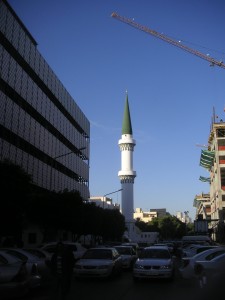A characteristic of Libya, a fortunate one in times of tension, is that it has no religious divides. Practically all Libyans are Sunni Muslims. Their society is conservative and they are attached to their traditions. They are not fanatics, on the contrary they insist that they are moderate and open to modern ideas. Recently I have heard the term "Islamic secularism" used by Libyans, only half jokingly.
It is pretty well taken for granted therefore that the Libyan constitution and the Libyan policy in general should be based on Islamic law, the shari'a, much as it was taken for granted in Britain in Gladstone's day that our polity was based on Christian principles.
The chairman of the National Transitional Council Mustafa Abd al-Jalil is regarded as an upright, uncorrupted, modest and incere Muslim. Some remarks he made recently about the shari'a and in particular polygamy were perhaps naive, in that they were predictably picked up in the international media as evidence that Libya is heading for a theocratic tyranny. That is misleading.
Polygamy is not common in Libya, and at least some Libyans were tempted to giggle at what he said, because it is associated not with modern Libya but with grandpa's memories of the tribe and the village, and also with super-rich Gulfies who for all their laundered white robes are not regarded as moral exemplars. As the Turks say, "On the outside he is like a saint's tomb, but oh my God the inside..! " On the other hand polygamy is regarded as a possible way of dealing with the problems of war widows, of whom there are many.
According to a well informed Libyan commentator Libyan Islamists fall roughly into three groups. First there are supporters of the Muslim Brotherhood, who are non-violent, though they are linked to the Muslim Brotherhood in other Arab countries who are a mixed lot. They have not formed a political party but seek to influence other parties. Secondly there are the Salafis who are individually fervent and socially active, possibly socially disruptive, but not political. Thirdly there are or were violent Islamists, mainly poor and ill-educated, some of whom have been active revolutionary fighters; there are stories that they have been encouraged and funded by Qatar.
The new "cabinet" contains no identifiable Islamists. Why not? Probably because the new cabinet is still transitional, that is to say members are individually committed to standing down once elections take place. Those who want positions of real power in the future are playing a waiting game. They may include Islamists; nobody really knows. That is the nature of democracy - always full of surprises. Any impact on business would be limited, and it is interesting that the Islamic party which was successful in the Moroccan elections last week has said it will promote Islamic finance but steer clear of imposing a strict moral code on a country that depends on tourism.
By Oliver Miles, Director, MEC International Ltd. Any opinions expressed are those of the author, and do not necessarily reflect the views of Libya Business News





